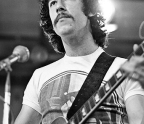





It wasn’t the number of records or concert tickets that he sold, and it certainly wasn’t his rock-god image that defined Jeff Beck – although he was plentifully endowed in all these departments. Rather, it was the unique depth and durability of his artistry that elevated him to the status of perhaps the best electric guitarist the world has ever known – and certainly the best over the distance.
Rather like Pelé or Michael Jordan or Roger Federer, Beck transcended statistical measures of greatness, to arrive at a state of grace where it was his peers who most enthusiastically acknowledged his supreme skill. David Gilmour called him “the most consistently brilliant guitarist”. Brian May declared himself to be “absolutely in awe of him”. And, as Steve Lukather put it, “No one will ever come close [to Beck]. One note is all he had to play and it was game over.”
“You’d listen to Jeff along the way and you’d say: ‘Wow, he’s getting really good,’” recalled Jimmy Page, when he was inducting Beck into the Rock And Roll Hall Of Fame (for the second time) as a solo artist in 2009. “Then you’d listen to him a few years later and he’d just keep getting better and better and better. And he still has, all the way through. He leaves us mere mortals just wondering.”
Given his generally robust condition and enduring presence among the classicrock greats, Jeff Beck’s sudden and unexpected death, from bacterial meningitis at the age of 78, has cast a long shadow over the rock world and thrown a new light on a career of sometimes explosive and always surpassing excellence. He had just finished one of his more industrious years, undertaking a lengthy stretch of dates in the UK, Europe and North America throughout 2022, promoting what turned out to be his final studio album, 18, released in July last year. The album was recorded with Johnny Depp, who joined him on tour – acollaboration that certainly underlined Beck’s continued willingness to offer unexpected challenges to his audience. He also performed a run of shows with ZZ Top and singer Ann Wilson which elicited more traditionally outstanding performances from all concerned. Check out the footage of Beck performing Rough Boy with ZZ Top, and marvel at how he converts a southern rock ballad into music of the spheres.
Thanks to his pioneering work in the 1960s with The Yardbirds and his own group, Beck was anointed alongside Page and Eric Clapton as one of the ‘Holy Trinity’ of English guitarists – all three of whom had passed through the The Yardbirds. But while Clapton subsequently retreated from his role as a virtuoso steeped in the blues tradition, and Page channelled the overwhelming majority of his energies into driving the Led Zeppelin juggernaut (which ground to a halt after the death of their drummer John Bonham in 1980), Beck never stopped his quest for mastery over all aspects of his instrument and new avenues for expressing himself on it.
Beck was a guitarist in the purest sense. He was not a singer (apart from his reluctant vocal performance on his 1967 hit single Hi Ho Silver Lining, and one or two tracks tucked away on his solo albums). And although he scooped up a few songwriting credits here and there – particularly on the Jeff Beck Group album Rough And Ready (1971) and his 2016 studio album Loud Hailer – he was not a lyricist and never really a songwriter per se.



His guitar was his voice and means of expression. His core creative mission was to attend in infinite detail to the touch, the sound and the playing of his instrument to ever greater degrees of excellence. You could describe the process as a lifelong spiritual quest or calling that he pursued, while leaving “mere mortals”, as Page put it, to wonder how he had done it.
Geoffrey Arnold Beck was born and grew up in Wallington, Surrey, where as a teenager he learned to play on a borrowed guitar. His primary influences were American blues guitarists such as Muddy Waters and Buddy Guy. Once he had got hold of an electric guitar, he started off with a brief stint in Screaming Lord Sutch And The Savages before joining local R&B group The Tridents. His big break came when his 21-year-old friend Jimmy Page – who was already making a name for himself as a session musician – recommended Beck as the replacement for Clapton in The Yardbirds in 1965, just as the band embarked on a string of trans-Atlantic hits starting with For Your Love.









